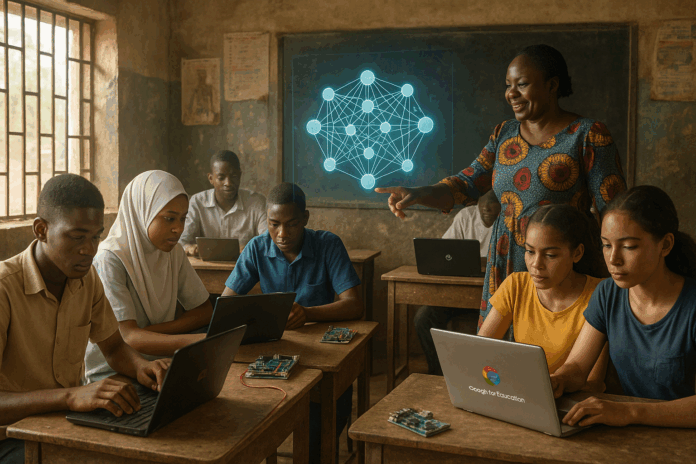Nigeria is pioneering Africa’s largest AI literacy initiative, targeting 157,000 secondary students by training 3,150 teachers across five states—Lagos, Ogun, Oyo, Ondo, and Ekiti. Spearheaded by Lagos-based tech educator NerdzFactory and the UK’s Raspberry Pi Foundation, with funding from Google.org and curriculum support from Google DeepMind, this program bridges policy and classroom reality. As AI promises to add significant value to Nigeria’s economy, this teacher-centric approach tackles a critical gap: equipping educators to nurture innovators, not just consumers, in a region where a substantial portion of the population is rural and underserved.
At NerdzFactory, we believe access to AI education should be a right—not a privilege. We’re empowering a generation to solve real community problems. Ade Olowojoba, Founding Partner, NerdzFactory
The Initiative: Experience AI Nigeria
Strategic Framework
The program represents a global-local collaboration, adapting the UK’s “Experience AI” curriculum to Nigeria’s cultural context. Resources include free lesson plans covering machine learning, ethics, and real-world applications—like using AI to predict crop yields or diagnose local health issues. The teacher training model spans an 18-month program through December 2026, blending predominantly online learning through live sessions and digital modules with strategic in-person workshops in rural zones with limited connectivity. Each participating teacher receives device access grants and joins localized support networks to sustain engagement throughout the program.
Equity-Driven Implementation
The initiative focuses explicitly on public schools in low-income communities, with NerdzFactory collaborating with state education ministries for scalability. This approach democratizes access—cutting across urban elites and rural innovators. Practical incentives include stipends for rural educators and peer mentorship hubs to combat high attrition rates, ensuring consistent participation from regions traditionally excluded from technological advancement.
Why Teachers Are Nigeria’s AI Revolution Catalyst
The Readiness Gap
National surveys indicate a significant portion of Nigerian teachers lack formal AI or digital skills training. Teacher training colleges historically omit AI from curricula, while urban private schools advance robotics programs—widening the educational equity gap. This discrepancy creates a situation where students increasingly use AI tools daily, yet untrained teachers cannot adequately address emerging risks like deepfake misinformation or plagiarism, leaving students vulnerable despite their curiosity.
Empowering Educators as Changemakers
The training initiates a crucial mindset shift, reframing AI as a pedagogical ally rather than a disruption. Practical applications include automating administrative tasks like grading, which traditionally consumed weeks of teacher time but can now be completed in minutes. This efficiency allows educators to redirect energy toward personalized student support and innovative teaching methods. Beyond technical skills, teachers emerge as ethical AI ambassadors in their communities. In rural areas particularly, they serve as bridges connecting disconnected students to global opportunities. The curriculum intentionally embeds modules on data privacy, bias mitigation, and combating misinformation—addressing urgent concerns in regions experiencing rampant digital fraud and information vulnerability.
Beyond the Classroom: Economic and Social Impact
Workforce Alignment
Experience AI directly supports Nigeria’s National AI Strategy and complements substantial federal investment in digital upskilling. Early evidence demonstrates tangible results: a pilot AI tutoring program in Edo State significantly boosted English proficiency metrics. The initiative also prioritizes gender inclusion, with data from prior interventions showing AI programs effectively reduce learning gaps for girls in STEM fields, creating pathways for broader participation in the digital economy.
Ethical Guardrails
Corporate-NGO synergy strengthens the program’s ethical foundation. Complementary initiatives training students in responsible AI use highlight how multi-sector collaboration reinforces core values. Google representatives explicitly emphasize responsible utilization, urging students to avoid plagiarism and instead customize their learning paths ethically. This emphasis on localized, culturally relevant AI models prevents “digital colonialism” by ensuring tools reflect and respect Nigerian contexts and diversity.
Navigating Challenges: Adaptive Solutions
Addressing infrastructure limitations remains paramount. The program employs mobile-optimized content and offline kits to overcome connectivity barriers, ensuring rural participants aren’t excluded. Approximately 30% of workshops occur in-person within these communities, guaranteeing hands-on experience regardless of internet reliability. Teacher retention strategies include targeted rural stipends and peer mentorship networks, building on global successes where thousands of educators have been effectively trained through similar support structures. Simultaneously, advocacy continues for formal national AI education standards, with draft policies already under development with relevant educational bodies.
A critical need persists for expanded public-private partnerships to scale resources effectively. Significant investments from technology partners demonstrate the potential when private capital aligns with public educational goals, creating sustainable ecosystems for growth rather than relying on temporary interventions.
The Roadmap: From Literacy to Leadership
Phase-Based Expansion
The initiative follows a structured rollout: Between 2025 and 2026, the focus remains on reaching 157,000 students through trained teachers across the initial five states. From 2027 through 2030, the program will integrate AI modules into national teacher colleges and vocational training centers, embedding AI literacy systematically into Nigeria’s educational foundation rather than treating it as an add-on or temporary project.
Sustainable Ecosystem Building
Creating local talent pipelines connects student projects with startups and national research centers focused on AI and robotics. This integration ensures skills translate into tangible opportunities within Nigeria’s growing tech economy. Crucially, the program emphasizes cultural preservation. Educational debates increasingly highlight the necessity of blending indigenous knowledge with AI design, ensuring emerging technologies reflect and serve Nigeria’s diverse communities rather than importing external frameworks without adaptation.
Every young person deserves tools to create, innovate, and make ethical choices using technology. Katherine Leadbetter, Raspberry Pi Foundation
A Blueprint for the Global South
Nigeria’s teacher-first model offers emerging economies a replicable framework: invest in educators to democratize AI literacy. With nearly half of Sub-Saharan Africa’s population under 18, such initiatives transform demographic potential into an ethical innovation engine. The ultimate measure of success will occur when students transition from AI learners to AI inventors—solving local problems with solutions that resonate globally. Without this ethical and practical preparation, there’s a risk of creating a generation that’s connected digitally but remains vulnerable economically. This initiative transcends education reform; it represents a foundational investment in building resilient, future-ready nations capable of leading in the Fourth Industrial Revolution rather than merely participating.


